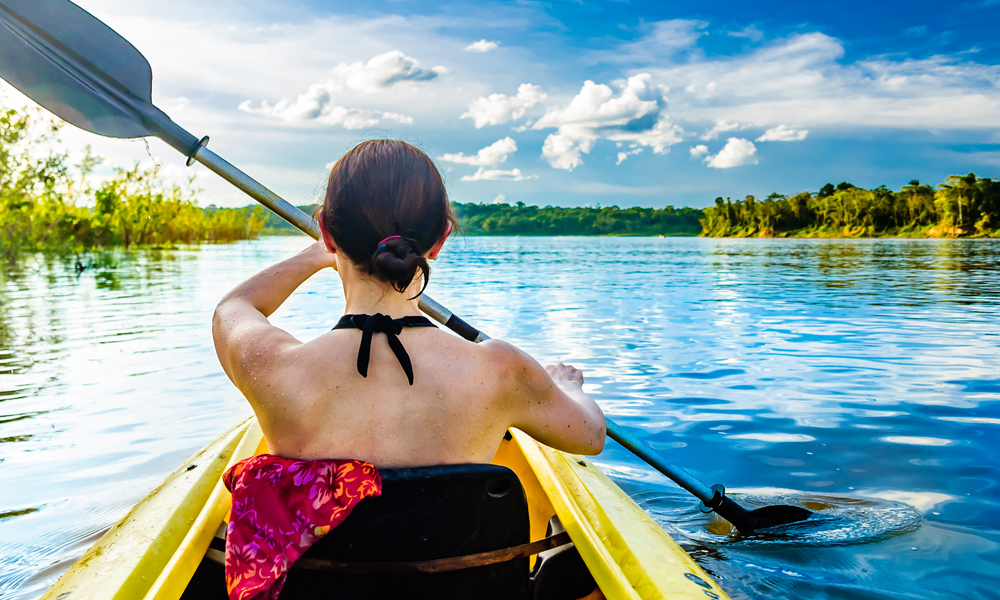Blog
Sun, sand and summer safety reminders
July 27, 2022
Simple summer safety reminders to enjoy fun in the sun
The Boundary Waters area that Ely-Bloomenson Community Hospital shares is uniquely beautiful, replete with stunning views, unique opportunities for adventure—and activities for outdoor enthusiasts of all ages. But before you explore the shore, put in a paddle or head out for much-deserved fun in the sun, remember that a bit of preplanning can help you avoid potential injuries and health hazards. Summer is short, but there’s no reason you can’t enjoy everything the area has to offer—and stay safe.
Before you head out on your next adventure, keep these safety tips in mind:
Fight the bite—and serious diseases—with permethrin
Mosquitoes, ticks and other insects are annoying, but they can also cause harm that's more irritating than just an itch, sting or bite. Serious diseases like West Nile Virus and Lyme disease are commonly carried by these buzzing bothers and lead to long-term health impacts—or even death. Mosquito repellent is a must, and it’s also a good idea to treat clothing and gear with products containing 0.5% permethrin. Permethrin is a chemical component that, when used as an insecticide and sprayed onto surfaces like clothing or mosquito nets, kill insects that touch them. Permethrin bonds to fabrics to prevent hitchhiking bugs from hopping on your gear—and onto you. Research has confirmed that permethrin interferes with the blacklegged tick (deer tick), the American dog tick (wood tick), lone star tick and the Asian long horned tick's ability to move—and thus, to bite—and spread potential diseases. Use the spray to treat shoes/boots, jackets, clothing, tents and other camping gear; the protection it provides even remains effective after several washings. Purchase sprays with permethrin online, at sporting goods stores and many retail outlets.
Be sun smart—protect the skin you're in
Although it’s been said many times, many ways, wear sunscreen. Skin cancer is the most common cancer worldwide, and nearly 20 people in the U.S. die daily from melanoma—the deadliest form of the cancer. Exposure to the sun’s ultraviolet (UV) rays can damage skin in as little as 15 minutes and while skin cancer is very serious, there is a bright side: skin cancer is also the most avoidable cancer—if you properly protect yourself.
Apply—and reapply—sunscreen
In addition to wearing long sleeves, pants and hats to cover exposed skin, apply a broad-spectrum sunscreen with a sun protection factor (SPF) of 30 or higher, and choose water resistant for the best coverage. Reapply every two hours, particularly if you’re sweating a lot or spend time in the water.
Check the expiration date on your sunscreen—it matters
The U.S. Food and Drug Administration (FDA) enforces strict guidelines for sunscreen manufacturers to conduct rigorous testing to help determine how long sunscreens are effective and reliable. If the date on your sunscreen has come and gone, buy a new bottle. It’s a worthwhile investment to protect yourself—and your family—from harmful rays that could lead to skin cancer.
Bring food and water
Pack high-protein snacks and water to bring when biking, hiking or hitting the water—even if you're only planning to travel a shorter distance. If something happens or you get lost, your trip could last longer than you anticipated. Plus, staying properly nourished and hydrated is essential to any physical activity and dehydration can happen faster than you think and impact your endurance, judgement and put your overall health at risk. And who likes being hungry or thirsty? You're out and about to have fun—bring a snack or two and fill those water bottles so you can enjoy the journey and have enough fuel to refill your tank for the return trip.
Stay connected—share your travel plans
Let someone know where you're going. Tell them the paths you intend to take and when you anticipate returning home, especially if you’re going on a longer journey. For those adventures where you're traveling long distances, choose a friend or family member who you can commit to checking in with at predetermined times so they know, if they don’t hear from you, you may need help. Keep your cell phone charged, bring a portable charger—and pack them in something that keeps them safe and dry. If something does happen, your inability to communicate can turn an inconvenience into an uncomfortable—or dangerous—situation.
Be prepared—pack a first-aid kit
The scouts know what they are talking about. Hope for the best—but be prepared for the worst. Bring a fully stocked first-aid kit with you on every outdoor adventure, with must-haves including:
- Topical treatments: alcohol prep pads, aloe, hydrocortisone, triple-antibiotic ointment and Medicaine® Sting + Bite Swab
- Oral medications: Benedryl®, Tylenol®, Ibuprofen, chewable antacid tablets and any prescription—or non-prescription—medicine that you or your travel mates may need
- Wound care supplies: bandages of assorted sizes, 2x2" and 4x4" gauze pads, ace bandage, hydrogel burn pads, 3" roll of gauze, 1" athletic tape, duct tape Moleskin®, Second Skin® or other blister kits
- First-aid tools: tweezers, nitrate gloves, safety pins, bandage shears and 12 cc irrigation syringe
Here in Minnesota—and everywhere—summer never seems to last long enough, so get out there to make the most of fun in the sun. Enjoy Ely's miles of waterways, trails, forests, beautiful wilderness lakes—or other destinations where you can enjoy time outdoors to unplug and reconnect with nature. Just be practical—and prepared—before you go, so you return home safely.
May you leave only footprints, take only pictures—and make wonderful memories. Of course, if you do run into the unexpected and need medical help, trust that the emergency team at Ely-Bloomenson Community Hospital is always right here if you need us. Happy and safe summer from your friends at EBCH! To learn more, visit our emergency services page.